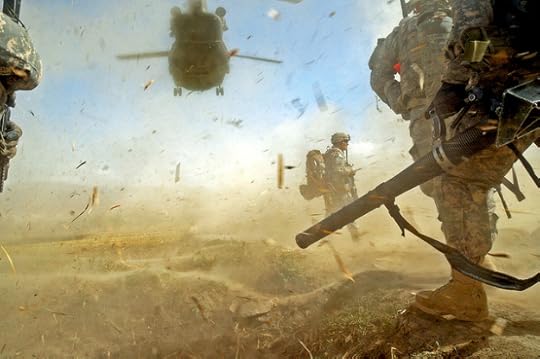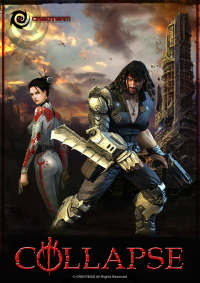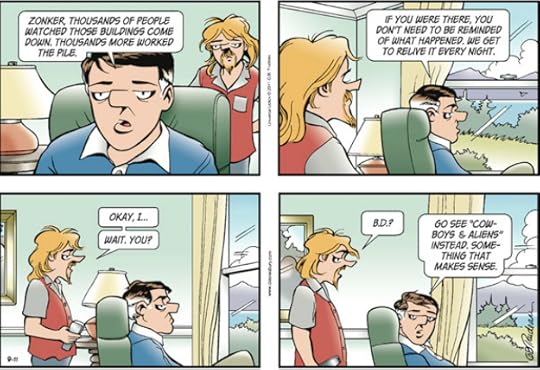Thomas E. Ricks's Blog, page 233
September 14, 2011
Iraq: The war there didn't end, we just are terminating our participation in it

Reading Joel Wing's
roundup
of violence stats from Iraq, and thinking about today's bombing
and yesterday's massacre of 22 Shiite pilgrims, I began to wonder if the
U.S. withdrawal from the war is succeeding -- that is, not ending the war, but
simply decoupling from it. According to Wing, even as no American troops were
killed in Iraq last month, the upward trend in violence increased. Here is the
average daily death count:
April: 7.1
May: 8.1
June: 9.4
July: 8.0
Aug: 10.2
China: That 15-year-old driving a customized BMW without a license and attacking people is a general's son

Annals of the oligarchs. China sure is getting interesting.
Funny how it allows its rich and powerful to act like a caricature of
capitalism.
September 13, 2011
Fasten your seat belt and read some courageous reporting from Pakistan

Dexter
Filkins has a
terrific piece in the new, Sept. 19 issue of the New Yorker
that at first glance is just about the recent
killing of a Pakistani journalist, but actually is kind of an overview of
the state of play with the ISI, the Pakistani intelligence agency.
I am glad that he did it, but also
awed that he did it. It takes real nerve to go around Pakistan these days
prying into the ISI's relationship to the Taliban and al Qaeda, and about
whether it is killing journalists -- especially in the country where Danny Pearl
was kidnapped and decapitated for doing something similar.
One item in the article
particularly struck me: A March 17 airstrike by U.S. drones not only killed
some insurgent leaders, but also the ISI officials with whom they were meeting.
Anyone interested in Pakistan
should run out and buy a copy of this article.
Auftrag-static (III): That German stuff sounds great, until you're trying to run a U.S. Army brigade in Afghanistan…

By Maj. Niel Smith, U.S. Army
Best Defense chief Auftragstatik correspondent
This is the view from being a Stryker BCT S3 in
Afghanistan:
1) Mission command requires stable, highly trained staffs and company/troop
commanders, proficient in their specialty and job. The Army is still unable to
stabilize the "deployment teams" of staff officers and commanders
more than three to four months prior to deployment due to the personnel chaos
and churn in our system. Staffs have little time to gel, establish SOPs, etc. The
most effective thing my commander had me create as an XO was a Squadron
Tactical Operations and Planning SOP, which laid out in painful detail every
step of the mission planning and orders process for each warfighting function. Over
the next six months I spent every Thursday morning teaching my own version of
the Captain's course to our (mostly) senior 1LTs filling captain's slots. The
SOP came in handy when people changed out or we received attachments - there
was no question about what that staff officer's role was and what they
contributed to the orders development process. This was especially critical for
the non-traditional staff -- the information operations officer, civil military
officer, electronic warfare officer, etc. It paid great dividends upon
deployment.
2) Company level commanders are more junior than a decade ago, and it reflects.
While they are highly adaptable, they are not experienced in how they fit into
the larger picture. Their life in the Army has been bouncing from ARFORGEN-deployment-reset-pcs-repeat...
They tend to be weak on long range planning and thinking, and struggle to
understand how they fit into the fight above them. For example, I spent (a
somewhat excessive) 3.5 years on BN and BDE staffs prior to command as a
captain, since Germany at the time had a long command queue with few units and
many HQs feeding captains. However, this gave me tremendous insight into
logistics, personnel, and operations that enabled me to be far more successful
in command than if I had taken over right after the career course. All the
troop commanders I worked with as a squadron XO were just out of the captain's
course and took command upon arrival in the unit. Their prior experience
varied, but few had served as more than a PL or XO. As a general rule, they did
not understand the BN and BDE fight, the staffs, and how to use them. They also
did not get the perspective from learning the unit as a staff officer before
taking command, learning how things work, the personality dynamics, and
watching other commanders succeed and fail. They were smart and energetic, but
simply struggled within the sink or swim environment they were cast into.
[[BREAK]]
3) Few people would recognize the sheer
amount of complex equipment fielded to a brigade today that requires sync. There
is much, much more to integrate. We have UAVs employed by every echelon from
Company to Theater level, plus helicopters and CAS to manage. The airspace is
complex and must be deconflicted. We have signals collection gear that does
some amazing stuff. We have ground penetrating radar mine detectors. We have
precision guided mortar rounds. We have explosive detection dogs. Electronic
jamming gear. We have various MISO/PSYOP assets, such as portable radio
stations. We have balloons to integrate into the ISR plans with all kinds of
towers. We have a host of interagency and joint embeds. We have ISAF/NATO
countries which may or may not speak the language. We have SOF assets playing
in our area with their own enablers. The list goes on but you get the idea. None
of this can be employed haphazardly or we lose the effect of the system, or
worse, the systems "fratricide" each other unless someone is looking
holistically at the employment. So mission command has its limits.
The net result of the two above factors (untrained/junior staffs and commanders
at the tactical level, new and complex enablers) is a need to be more directive
and lockstep in planning and orders development. I am not convinced that this
is a bad thing.
A good example happened two weeks ago on the BDE staff - we came up with an
operational plan based on commander's intent, and pitched it to the BDE deputy
commanding officer. As we briefed it became evident the various staff functions
were not well synced -- so we went back and did a detailed, traditional wargame,
straight out of the FM. The value was evident. The enablers we overlooked were
inserted. We identified several decision points missed during the course of
action development. We got our logistics synchronized to the maneuver plan in a
much firmer way. As MG Scales said, it kept us from doing things like
forgetting the BN mortars.
Mission command is a sliding scale. With a stable, experienced staff and
commanders, I think it has significant merit. When the prior conditions are
absent, more detailed planning is required. The last 5 years have been a
hurricane of rapid promotions, weak PME, and hastily formed units. Hence I have
become much more of a detailed planner than I ever thought I would have become,
or even wanted to. However, the alternative is a generically planned and
synchronized operation that may get a Soldier killed because we forgot to
resource mine clearing charges for the engineers or didn't ensure the
helicopters and UAVs weren't operating in the same altitude band ...
Major Niel Smith is an armor officer and brigade
operations officer deployed to southern Afghanistan. Opinions are, but of
course, his own and not endorsed by either DoD or Terry
Francona. Certainly not by Papelbon, who has never agreed with Van Creveld's
assessment of Germany military culture.
Fox News scoop: Obama lied, U.S. troops are on the ground in Libya!

What a story! It
turns out that four
military personnel deployed to the U.S. embassy to help with security and
explosive ordnance disposal. For Fox, this apparently constitutes President
Obama breaking his vow not to insert troops. The article actually begins, "Despite
repeated assurances from President
Obama and military leaders that the U.S. would not send uniformed military
personnel into Libya
..."
I wonder if one day having worked for Fox News during our
time will be regarded like being a supporter of Sen. Joe McCarthy in the 1950s.
I think Fox may be the most destructive force in American society nowadays,
basically pouring poison into the stream of our political discourse.
(HT to a captain of the Marines)
BD comment of the day: The second act of the Doonesbury character BD

I was struck by this observation
by "JESTEPHENS" about the BD character in Doonesbury: "If only we all
were as reflective as BD has become. Remember in the early days of the strip
how emptyheaded and reactionary he was. Trudeau has taken BD from that
shallowness to a character who has become something of a cultural barometer."
This is one of those things that seems obvious when you read
it -- but it had never occurred to me. BD is now one of the major heroes of the
strip.
September 12, 2011
The defense budget implosion (VIII): Sir Michael Howard on how a financial squeeze can sharpen defense thinking

For part of my
book, I decided to go back and check the origin of the thought often attributed
to Sir
Michael Howard, the World War II hero turned military historian, that
everyone gets it wrong at the beginning of a war. I was told once at the Army
War College that he continued the thought this way: so, the important thing is
not to get it too wrong.
Well, it turns out
that isn't quite what he said, at least in the article I found, "Military
Science in an Age of Peace," published in the RUSI Journal in March
1974. What he said was that everybody gets it wrong so the important thing to
do is develop the intellecutal capacity in officers to adjust faster than the
other guy. That's quite different.
Anyway, all that
mess goes into the epilogue of my book. But in the same article he also has an
interesting discussion of how to think about defense acquisition. New weapons
and other purchases, he says, grow out of a "triangular dialogue between ... operational
requirements, technological feasibility and financial capability." He
continues:
In discerning
operational requirements the real conceptual difficulties of military science
occur. If there is not rigorous thinking at this level, neither technology nor
money can help. With inadequate thinking about operational requirements, the
best technology and the biggest budget in the world will only produce vast
quantities of obsolete equipment; bigger and better resources for the wrong
war. Indeed, it can sometimes be suggested . . . that ample resources can be
positively bad for the military because this enables them to shelve the really
vital question: what do we really need and why?
The defense budget
is gonna go waaaay down, so might as well groove on the vibe, as it were.
Auftrag-static (II): It can't happen here in the Air Force -- and I'll tell you why

By "A. Checklist Monkey"
Best Defense guest columnist
When I first read the
commentary by Jörg Muth comparing the different command philosophy/command
cultures of the Armies of Germany and the United States. I couldn't help but laugh. My
very first thought was, "If he thinks the Army is bad, I wonder what he
would think of the Air Force!" As a space and missile operations officer
in the USAF, not only is the concept of Auftragstaktik foreign, any
exercise thereof could possibly get you thrown in jail!
As an ICBM ops officer, I was trained from day one to not think for
myself, to always follow checklists, and to never try and shotgun
anything. Time and again in my training I was told to "Just follow the
checklist," or "The checklist will take care of you." For the
most part, they were right. Nearly 50 years of ICBM ops gives you a lot of time
to work out the bugs in a system. If something went wrong out in the field with
one of the missiles, and it was discovered that you made a mistake by not
following your checklist, you were at risk of being relieved of duty, given
extra training on top of your regular training, and having to go through the
process of being re-certified to perform nuclear alerts again (a process that
could take a day or several weeks depending on the severity of the error). You
weren't allowed to think for yourself. You were trained NOT to.
There is a reason AF space operators call themselves "Checklist Monkeys."
"Read a step, do a step, eat a banana," is a common quote thrown
around in the space ops world.
Even when I was not out in the field sitting on alert, I experienced massive
frustration at the micro-management and inflexibility of how life in the
missile world was being run. When I was a 2Lt, I very quickly came to realize
how nothing would ever change after I made a few suggestions about how the
alert shift schedule could be worked better (a quality of life issue, I admit).
I was told point blank: "Interesting idea, but forget about it because
nothing's gonna change." He was right. In the nearly five years I was in
my missile wing, nothing did. When it came to annual performance reports--in
the AF we call them OPRs for officers, EPRs for enlisted--they had to be
coordinated up to the WING COMMANDER. Not just signed off, mind you. I mean
that the Flight, Squadron, Group and Wing levels all had to get their hands on
that OPR/EPR, make changes, send it back down the chain so the changes can be
made, and then send it up again for more review/changes before it was signed
off. I had an OPR I wrote on one individual take THREE MONTHS to get approved. Auftragstaktik?
What's that? [[BREAK]]
It is hard to imagine the concept of Auftragstaktik being exercised on
the satellite ops world. If an AF Lt decided to change the orbit of a satellite
on their own, he or she would be keelhauled. Those decisions are made at the
O-6 and above level. Not even a space squadron commander (O-5) would do that
without consulting with the Joint Space Operations Center (JSPOC), AF Space
Command, 14th AF, the contractors who built the satellite, etc. Satellites are
super-expensive, and are not easily replaced if something goes wrong (if they
are replaced at all), so you better believe that commands sent to them are
triple checked before you hit "enter." Anyone who would try to make a change to
a space system on his or her own would not only have their sanity questioned,
but perhaps thrown in jail for possibly rendering a $300 million bird useless.
Let's talk doctrine for a minute.
The AF loves that doctrine thing. You can fill several phonebook-size volumes
with the amount of doctrine that the AF has. At some point in their career,
every Airman is given a copy of AF basic doctrine, which is a multi-volume set
of books about as thick as Tolkien's The Hobbit. This is the BASIC
doctrine (AFDD1 is the most basic AF doctrine document). The AF has operational
and tactical doctrine for EVERY MISSION TYPE the AF accomplishes (ie Air Ops,
Space Ops, etc). There is NOBODY in the AF that could possibly read, retain and
apply all of that knowledge in a given situation; and I don't know anyone who
has even tried. Pilots might train to react in a way that conforms to AF doctrine,
but do you think that they are thinking about AF doctrine when flying? I'm not
a pilot, but I doubt it. Was I thinking about it when I was sitting on nuke
alert eating potato chips and watching TV in my wife-beater t-shirt and sweat
pants? Nope.
Now, I admit that I might be comparing apples and oranges here. (operating in
space vs on ground), but my impression is that AF command philosophy is way more restrictive. Does it have to be that way because of the types of
missions we do? Maybe. How would Auftragstaktik work with ICBMs? Do I
think that the LTs and Captains on alert should be able to re-target the
missiles on their own, or launch whenever they feel it is necessary? Holy good
god no. Should the crew sitting shift on the satellite control console be able
to move the $4 billion satellite constellation around as they see fit? Probably
not. I hate to be the guy who throws a turd into the punchbowl and leaves, but
when it comes to performing the mission, I am not sure how AF space culture
could adopt Auftragstaktik. Maybe it could, but I really don't know how.
Maybe I have been trained too well not to think about it.
"A. Checklist Monkey" is a major in Air Force
space operations.
My two favorite 9/11 comments

Despite my intentions, I wound up
reading a smattering of the 9/11 coverage. Lots of energy expended by the
writers, I am not sure to what end. I think yesterday's Doonesbury
strip captured my feelings best.
And my second
favorite comment is from old Francis Fukuyama: "Since 2001 the most
important world-historical story has been the rise of China. This is a
development whose impact will almost certainly be felt in 50 years' time.
Whether anyone will remember Osama bin Laden and al-Qaida at that remove is a
different matter."
September 9, 2011
No 9/11 column here, but 2 questions: Where are the memorable 9/11 movies? And did we suffer a national panic?

I'm already sick of the 9/11
coverage and it isn't even September 11th yet. This anniversary is worth
noting, perhaps with a day of quiet reflection, if you like that sort of thing.
Mainly I find myself thinking right now about friends and colleagues who aren't
with us anymore. I think of these people as friendly ghosts. I don't mind
having them around at all.
But just because 10 years have
passed does not mean that the day is particularly newsworthy. I'm seeing a lot
of dutiful reporters writing 9/11 stories because their editors expect it, not
because something new happened to write about. (Here's FP's Joshua Keating with
a
good overview of the blathering. And here's FP's summary
of the TV shows.)
Rebecca (of "War
Dog of the Week" fame) asked me tother day if there is a list to be done of
9/11-related movies. The odd thing I really can't think of a good movie about
9/11 -- my measure being whether the movie sticks with me. Even the
documentaries I watched, and there were several, struck me as weak.
So where are the memorable 9/11
movies? Is it that not enough time has passed? I can remember back in the 1970s
when people were asking the same about the Vietnam war movies, and then a bunch
came along, including Apocalypse
Now, which is great but flawed, like many of the most interesting works
of art.
The other question, politically
more important, is whether we underwent a national panic after 9/11. I think we
did. But it probably is too early to tell.
Thomas E. Ricks's Blog
- Thomas E. Ricks's profile
- 436 followers



